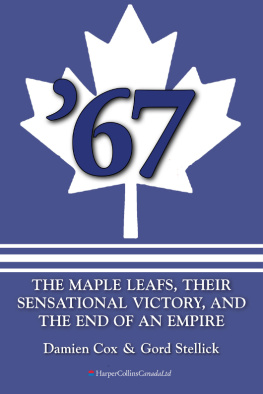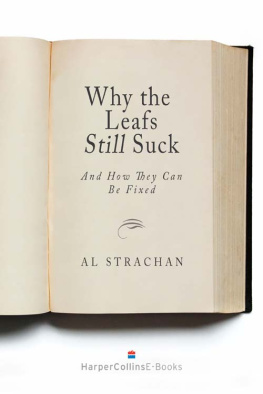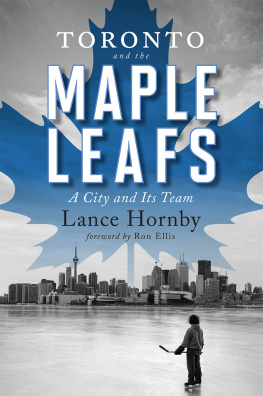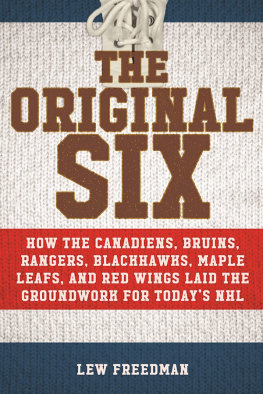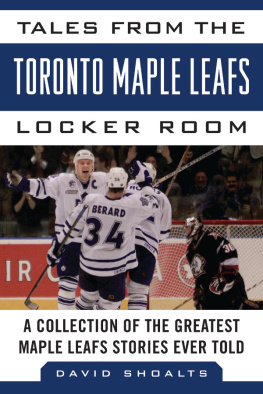The idea for this book was formed by decades of memories and the sense the story of the 67 Leafs had yet to be fully told. It was crystallized during a late night marathon phone conversation between Montreal and Toronto in the fall of 2003 and, despite various twists and turns, never lost its original energy. Our thanks go out to the living members of that 67 Leaf team, all of whom, without exception, helpfully co-operated with this book, mostly by being far more interested in talking about their teammates than themselves. They truly were a great team, and in many ways remain that to this day.
The authors would also like to thank John Shannon of Leaf TV for providing helpful video evidence of that spring, and to Hadley Obodiac, the daughter of the late Leaf public relations executive Stan Obodiac, for providing many compelling photographs.
Many people generously contributed their imaginations and ideas, a list that includes Jim Gregory, Trent Frayne, Bobby Orr, Bobby Haggert, Bob Stellick, Anne Barilko Klisanich, Bill Watters and Jim McKenny. The Toronto Star Syndicate provided invaluable research material through its Pages of the Past, and The Blue and White Book by Andrew Podnieks was invaluable in making sure the facts of the story were kept straight.
We also would like to thank Phil Bingley for being the first to tell us this was a great idea, and Vicki White and Lisa Stellick for continuing to tell us this was a great idea over the months.
Finally, our thanks go to Karen Milner at Wiley, who always, always provided an encouraging voice and more than a few important pointers along the way.
Our goal was to tell a story that, in many ways, hadnt been told fully. We hope we accomplished that task.
Damien Cox
Gord Stellick
September 2004
Each player understood the obstacles to winning the Stanley Cup that season, 1967, and some felt the undeniable decay that was already eating at the foundation of their team, the Toronto Maple Leafs. They knew, quite obviously, that theirs was a team of greybeards, one of the oldest clubs to ever pose a serious bid to capture the Cup. They knew, from their shared experience and the very different nature of the individuals in their dressing room, that pro sports was changing in a very fundamental way, moving away from the stiff, patriarchal, dictatorial traditions that had ruled for decades, traditions that their commander, Punch Imlach, clung to like a desperate man clings to a lifejacket. They knew that their team lacked goal-scoring and youth at key positions, relied on injury-prone goalies and included some brittle, erratic personalities that created tensions within the team. They knew they had endured a most difficult regular season, one in which theyd lost 10 consecutive games at one point, and that their team was vulnerable to an opponent willing to meet the challenge of snuffing out the stubborn spirit of a near-dynasty that still had some fight left in it.
But there was also much they didnt understand. That experienced, determined group of Maple Leaf players that would record such a dramatic accomplishment in the spring of 67 could not have known that the men who signed their paycheques were also stealing money from the team and its shareholders, and committing crimes that would bring the force of the law down upon the franchise and humiliate the proud club. They might have sensed, but couldnt have fully understood, the manner in which the organization was squandering its heritage and losing its once feared ability to control key sectors of Canadas hockey talent landscape. They didnt know that Imlach, trading on his successes, was involved in a curious series of business transactions and beginning a process of poor management decisions that would see him destroy the franchises competitiveness not once, but twice, in just over a decade. They sensed with some trepidation that a players union could be in their best interests, but didnt fully understand the aggressive ambitions of the man who would bring it to them or how that union would fundamentally alter the nature of the business. They didnt know, and wouldnt find out for decades, that while they were taping their sticks, nursing their injuries and testing newly sharpened skates within the confines of Maple Leaf Gardens, their home away from home, that a horrifying pedophile ring was beginning to spread its ugly tentacles within the very same walls. They could not have known that some of the most important members of their team would die in tragic ways in the years that immediately followed, while others would become estranged from the club, hopelessly alienated from the group that had seemed so focused upon their common objectives that golden spring. In general, they could not have grasped the beginnings of a destructive process that would unfold over the ensuing decades and bring the team that once had been the pride of English Canada to its knees.
They were hockey players, not detectives or soothsayers. They were sons and fathers, some educated and some not, ambitious heroes and flawed characters, men who sensed the hockey world was not quite what it had been just a handful of years earlier, but were still focused on using their physical and mental skills to achieve their dreams in the game that some loved and others saw merely as a means to gaining wealth and fame. That the 67 Stanley Cup triumph was a mask that covered crime and decay, tragedy and human frailties, nepotism and greed, does not diminish their accomplishments. Rather, the fact that that collection of athletes was able to capture a Cup in Canadas centennial year is enhanced by the hurdles they overcame. Understanding, in retrospect, all that was happening at the time doesnt denigrate the accomplishments of those players, but rather amplifies them. Coming to grips, for example, with the fact that Imlach was, by 1967, a wholly destructive manager and outdated coach accentuates the excellence of the players, giving many the credit for that 67 Cup they have never justly received.
The passage of so much time has mythologized that 1967 Leaf team and turned it into an elusive standard of supposed greatness to which every subsequent edition of the team has failed to measure up. The memory of that team is hearkened back to as though somehow in the legacy of the 67 Leafs there is a model to followa blueprint to greatness. But this take on 67 is wrong. That team at that time and place was actually a once powerful club in serious decline, an organization that wasnt ready to meet the challenges of change, both within the business in which it operated and the cultural fabric of which it had been such a compelling element.
The basic question that befuddles Leaf fans is straightforward. How could a team that won an extraordinary four Stanley Cups in six years1962, 1963, 1964 and 1967fail to achieve anything close to that level of success in the decades that followed? How can this be explained and understood? The 67 Cup was clearly a turning point in the history of the franchise, an unexpected success that fed the arrogance and greed that had grown within the club over that magically successful decade. Winning fed the sense that championships would always happen because they always had. Indeed, you could make a compelling argument that the franchise might well have been better off had it not won the Stanley Cup in 67, that winning exaggerated all the organizations worst characteristics, allowed internal infections to fester rather than be salved and allowed those who wished to use the Leafs and Maple Leaf Gardens as a shield for their shady designs to operate more freely and effectively. The years of losing on the ice that followed the 1967 championship twisted the character of the club, gradually turning the Leafs into an operation that defined success by profit more than by wins and Stanley Cups. As the years went by and Harold Ballard turned the Leafs into a laughingstock, and as those who succeeded him were eventually forced to admit to inside knowledge of the sexual abuse crimes committed inside Maple Leaf Gardens during the 1960s, Conn Smythes 1966 indictment of what he saw unfolding, that the Leafs had started to put cash ahead of class, seems to have been a premonition of startling accuracy. Looking back, winning in 67 allowed the team to blithely continue as it always had, not understanding that the times were changingand fast. Winning in 67 was important, not because thats when things were right, but because thats when it all started to go so very wrong. This is the story of a remarkable group of athletes who managed to achieve immortality amidst unfolding chaos.

